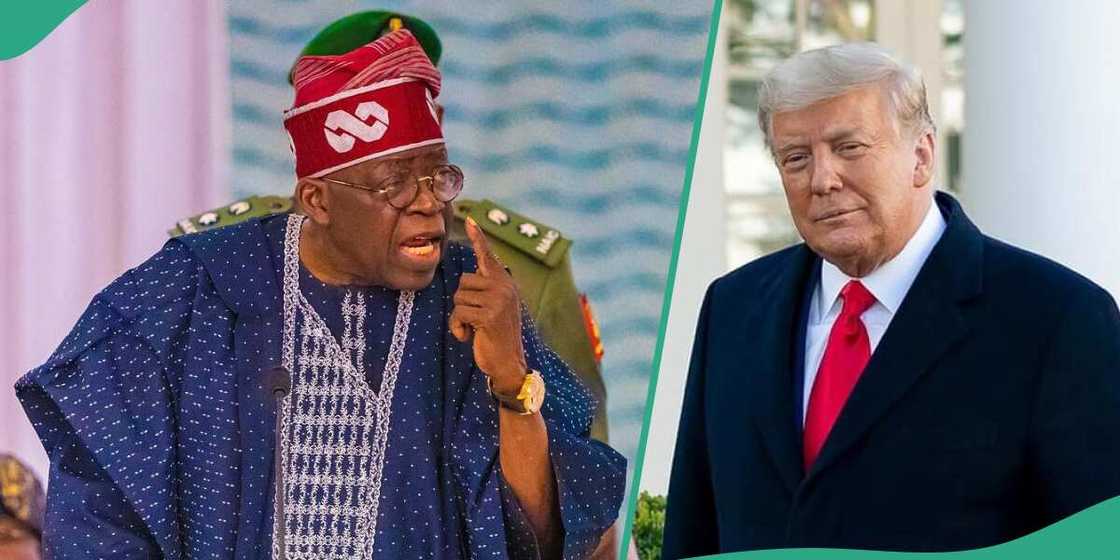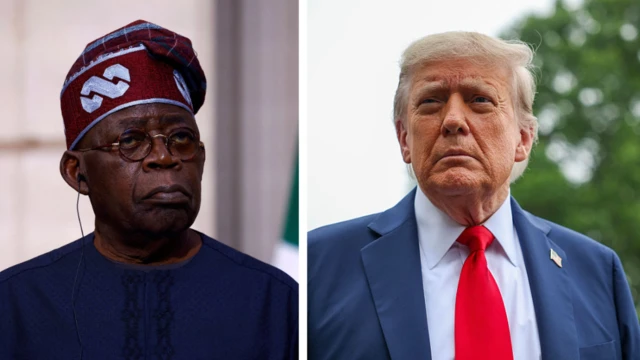Mr President, members of the political and governing class, elites and bourgeoisie, captains of industry, academicians, community leaders, and every citizen who calls this land home. Take this as both a counsel and a provocation from a humble mind schooled in the art of strategy and hardened by history’s unkind lessons.
Considering the strategic importance of the issue under review, the piece will be unusually long and run the risk of being boring. All the same, let’s get started.
The primary function of a statecraft, which is the art and science of managing state affairs, is not to necessarily parade politeness, be Mr. Nice, or a yours obedient servant to heartless bullies in diplomatic cycles; it is to secure the life and liberty of a people against those who would take both. To make Nigeria costly to attack shouldn’t slogan; it must to be a programme for national survival, a doctrine that insists the cost of aggression must always exceed any conceivable gain. If the price is unbearable, aggressors pause; if it is intolerable, they withdraw. The task before us collectively is to build that price into the body of the nation, political, economic, social, cultural and military, so that any thought of intrusion is met not with calculation but with dread. This is not warmongering. It is deterrence which is civilisation’s most effective preservation technique when and if applied with discipline, foresight and moral clarity.
Begin with the central truth: deterrence is a product of credibility. Credibility is produced by capability, cohesion and will. Capability is material and organisational as it applies to weapons, sensors, logistics, secure command networks. Cohesion is political and societal as in unity of purpose, resilient institutions, trust between rulers and the ruled as well as between the leaders and the led. Will is the intangible that turns capacity into deterrent reality; the posture and policy that unambigiously tells a bully with perfect clarity that an attack will be met with comprehensively unacceptable consequences. Nigeria must pursue all three in equal measure. Capability without cohesion invites betrayal. Cohesion without capability invites exploitation. Will without both is bragadocious rhetorics that collapses under pressure. Therefore the strategy must be whole-of-nation, not a parade of uniforms and speeches.
Defence begins with deterrence in the conventional sense: deny easy victory to those who might contemplate force. This requires a layered approach to geography, technology and tactics. The base layer is situational awareness: a sovereign state cannot defend what it cannot see. Invest in a national sensor grid that integrates air, maritime and terrestrial domains into a single common operational picture. This does not mean buying every shiny platform on the market; it means deploying cost-effective radars, maritime domain awareness buoys, ground observation systems, and a networked architecture that fuses intelligence from satellites, UAVs, human sources and signals intelligence into rapid decision loops. Speed of recognition shortens an aggressor’s window for plausible deniability and raises the risk of a failed strike. Fast recognition must be followed by resilient command-and-control; the nervous system of the state must not be fragile. Harden command centres against cyber and kinetic strikes, decentralise critical nodes to prevent a single decapitation, and practise rapid failover so that orders flow even when parts of the network are degraded, downgrade, decapitated or compromised.
The maritime and littoral domain around Nigeria is an economic and strategic artery. Deny the sea to those who would exploit it. Build layered coastal defences that combine coastal surveillance, fast interdiction craft, maritime patrol assets and strategically placed shoreside anti-access measures. Think of the coast not as a line to be guarded but as a web to be controlled: persistent patrols, maritime coordination centres, local naval militia drawn from coastal communities, port security modernisation, and a legal regime that permits swift interdiction of hostile or suspicious vessels. Ports are national economic nerve-ends; secure them and you safeguard the economy. Let it be clear: a state that cannot protect its maritime commerce invites coercion; a state that can turn commerce into a poisoned chalice for intruders restores its bargaining power.
Air defence is equally non-negotiable. The skies are a theatre for rapid, asymmetric harm. Early warning, layered mobile anti-air systems, and an integrated interceptor capability that blends indigenous systems with allied support form a disincentive for strike campaigns. At the same time, invest in a competent aerial reconnaissance fleet. Drones and persistent intelligence, surveillance and reconnaisance (ISR) platforms cost far less than bombers and, when networked properly, deliver a disproportionate increase in situational awareness. The aim is denial of sanctuary to strike aircraft and to create an environment where air attacks cannot be launched with impunity.
Yet material defences alone do not make a country costly to attack. The second pillar is economic resilience. Wars are often economic in character long before a single shot is fired. A vulnerable currency, a thin reserve, an economy tethered to a single buyer or supplier is not sovereignty; it is dependency. Diversify trade relationships, deepen domestic industrial capacity, and create buffers, currency swap lines with trusted partners, stockpiles of critical inputs, and an energy matrix that reduces choke points. More variety, fewer weak spots equals stronger energy security. Build a domestic defence-industrial base that can at least maintain and supply critical platforms in wartime; local capacity does not need to be world-leading in every domain, but it must be robust enough to deny adversaries the advantage of a long-term blockade. Invest in logistics hubs, rail links, and resilient energy networks so that supply lines cannot be severed by a single campaign. Economies that function under stress raise the cost of occupation; economies that collapse invite the invader to play with unruly puppets which we may have in abundance.
The third pillar is societal mobilisation and civil resilience. An invader counts on fracturing society, divided house, exploiting grievances, and co-opting elites willing to burn the nation to rule the ashes. The answer is to make societal fragmentation costly. Invest in inclusive institutions that reduce the salience of identity as the axis of grievance. Reform and genuinely fund grassroot governance so that grievances have legitimate channels for redress. Strengthen judicial independence and anti-corruption mechanisms to deprive opportunists of the spoils of collaboration. Create civic defence structures: well-regulated, trained, and accountable reserve forces drawn from communities who defend their own towns and villages. These are not militias in the lawless sense; they are territorial defence units operating within a legal framework, trained to challenge occupation, and make any occupying force’s task unbearably costly. Their existence complicates any invasion plan; it converts a blitz into a grinding, attritional campaign with no political benefit.
Information is weapon and shield alike. The fourth pillar, therefore, is strategic communications and information defence. An invading power will attack narratives as readily as material targets. Build a state capacity for truthful, timely, and persuasive information that counters misinformation, exposes false pretexts for intervention, and rallies domestic and international support for Nigeria’s sovereignty. Invest in professional public diplomacy that reaches diasporas, global civil society, friend nations and skeptical publics. Simultaneously harden the information space against foreign influence operations through cyber defences, media literacy campaigns, and an open yet secure social media policy that distinguishes between legitimate critique and orchestrated subversion. The battlefield of public legitimacy is often decisive long before the first shot.
Cybersecurity is the sinew that binds the modern state. The fifth pillar is a national cyber posture that protects critical infrastructure: banking, telecoms, energy, transport, healthcare, and that can retaliate proportionally when threatened. Establish a national cyber command with legal authority to defend, monitor and, where necessary, impose countermeasures. But remember this: cyber power without norms risks escalation and civilian harm. Build international legal frameworks and bilateral understandings with partners so that cyber deterrence operates within predictable bounds. Cyber resilience reduces the chance that an external actor can paralyse the state with economic or informational blockades.
Diplomacy is the silent precondition of all military measures. The sixth pillar is strategic alliances built on reciprocity. Nigeria must not be naïve about alignment; neutrality is a posture that only middle powers with balanced leverage can sustain. Forge defence pacts that include mutual assistance, joint training, intelligence sharing and parts-supply agreements. These pacts must go beyond photo opportunities to include concrete, verifiable measures such as joint logistics hubs, pre-positioned materiel, and coordinated sanction scripts that will raise the price of aggressors. But alliances should not be exclusive. Diversify partners so no single patron can manipulate policy through coercion. Equally, avoid becoming an arena for proxy rivalry. Use great-power competition to increase bargaining power, not to transfer sovereignty. Diplomatic craft here is to extract guarantees without surrendering independence.
Preparation of the human capital that sustains all of this is the seventh pillar. Defence depends on competent, well-trained, technologically literate personnel. Reform the military education system, expand technical post-graduate programmes in defence technology, reward innovation, and create career incentives that keep talent within the country. Encourage a culture of professional ethic in the armed services that respects civilian control and human rights; competency and legitimacy are twin pillars of a military that enjoys popular trust. Invest in veterans’ welfare, rehabilitation programmes and social integration so that being a soldier is a respected and stable profession, not a path to rogue power.
Resilience also requires a legal and institutional environment that makes subversion costly. The eighth pillar is governance reform. Tighten procurement transparency to close avenues of corruption that compromise defence readiness. Create parliamentary oversight that is informed but non-partisan. Strengthen towns and cities capacity for disaster response so that governance vulnerabilities cannot be exploited by external actors as evidence of state collapse. If institutions work, enemies cannot plausibly argue that the state is collapsing and therefore in need of “protection.” Good governance is not a luxury; it is deterrence by other means.
Economic security must be translated into social security. The ninth pillar concerns national cohesion through opportunity. When vast swathes of youth are unemployed and alienated, they become a ripe terrain for outside actors to manipulate or for domestic spoilers to exploit. Launch a concerted, concrete, tangible, transparent and accountable programme of job creation across all regions and the urban peripheries linked to infrastructure projects, agritech, renewable energy and defence-ancillary industries. Prioritise vocational training that produces immediate employable skills and channels youth into national service that contributes meaningfully to defence and development. An engaged youth bulwark reduces susceptibility to recruitment by criminals or foreign provocateurs.
Don’t neglect logistical depth. The tenth pillar emphasises strategic stockpiles, transport redundancy and industrial surge capacity. Wars and blockades often operate through the strangling of supply chains. Build warehouses, silos, resilient rail corridors, and alternative ports so that commerce can be rerouted quickly. Establish a sovereign maintenance and logistics enterprise competent in armaments repair, medical supply, and fuel distribution. Industrial surge capacity means the nation can transition rapid civilian industry to defence needs if necessary, without halting civilian life. This is a classic attribute of states that survived existential threats with dignity.Legal and moral clarity are often the unsung pillars. The eleventh pillar insists that the rules of engagement, citizen rights, and the limits of state power be codified and publicly defended. Nations that sacrifice their liberties in the name of security find themselves delegitimised quickly. Keep the rule of law rigorous so that domestic sacrifice for defence retains moral standing. Ensure independent judiciaries, protect the press, and make human-rights training part of military doctrine. A people that believes in the cause will fight with determination and sustain morale better than any conscripted mob.
Intelligence and covert resilience complete the framework. The twelfth pillar argues for a modern intelligence apparatus that penetrates hostile networks, forecasts threats, and provides early warning. Intelligence must be fused with diplomacy and economics to create anticipatory strategies. But intelligence without oversight becomes a danger to the state itself. Create parliamentary intelligence oversight with secure clearances and strong ethical constraints. Use strategic counterintelligence to ensure that adversaries miscalculate. An enemy that is uncertain about whether its plans will be exposed is a cautious enemy. Uncertainty is deterrent.
Finally, the most important pillar of all is national narrative and commitment. Strategy that lacks moral purpose is brittle. Make the defence of the nation a living covenant with every citizen. Educate the public about the stakes without inflaming xenophobia. Celebrate pluralism as the strength that invaders seek to fracture. A population united by pride in civic institutions, not by manufactured hatreds, is the most resilient front. Civic rituals, national service options, cross-regional economic projects and a transparent national budget that shows defence investment tied to social development will tie elite interest to popular welfare. When elites feel their fortunes are bound to the nation’s survival, the risk of collaboration or opportunistic flight decreases dramatically.
There are tactical considerations that follow naturally from these pillars. Prioritise asymmetric capabilities that exploit geography and deny an invader easy objectives. Invest in widely distributed anti-access measures, mobile precision fires, and resilient sea denial systems. Practicality matters; acquire systems that can be supported domestically and fielded at scale, rather than exotic platforms that are impossible to operate or maintain. Train for urban defence as much as for open warfare; modern conflicts are often fought in cities, and an occupying force excels at parading power in the theatre of humiliation but fails in the long grind of urban resistance. Plan logistics under contested conditions; a supply chain that works only in peace is worthless in crisis. Build redundancy into every critical node.
But above all, do not fool yourselves with the notion that deterrence is purely a matter of state action. Citizens, businesses, religious leaders and civil society are co-defenders. Encourage corporate continuity planning, involve universities in strategic research, protect journalists who expose manipulators, and support religious leaders who preach resilience and civic cooperation rather than sectarian division. A nation that can maintain basic services under attack reduces the strategic value of invading it.
There will be costs. Building credible deterrence requires sacrifice, fiscal discipline and patient institutional reform. It will demand political courage to resist the easy allure of short-term foreign capital, and a willingness to spend on infrastructure and capability rather than consumption. There will be hard choices about where to invest and whom to partner with. Choose partners that respect sovereignty and create mutual benefit rather than dependency. Use the leverage of Nigeria’s resources and population to bargain for technology transfers, not charity. Turn external competition into domestic advantage.
Mr President and fellow citizens, enemies calculate risk. We must increase that risk until aggression is irrational. Make every port, road, pipeline and city a potential thorn on the side of an occupier. Make every neighbourhood a locus of organised defence. Make your economy resilient, your institutions uncorrupted and your diplomacy shrewd. Train your forces to be adaptive and the citizens to be resolute. Turn uncertainty into deterrence, capability into credibility, cohesion into will. Do this, and Nigeria becomes a fortress in a world of predators, not by walls and isolation, but by integration of society’s energy into a single purpose: to render the cost of attack higher than any conceivable gain.
Strategy is the patient science of making the improbable impossible. Let us be patient. Let us be industrious. Let us be brave. If we stitch together these pillars, Nigeria will no longer be an attractive target for gangsters in fancy suit. It will be costly to attack because the vengeance of a defended people, the resilience of its economy, the depth of its partnerships, and the clarity of its will, will make occupation a ruinous, pointless endeavour. That is the ultimate deterrent. That is the mandate I leave with you: unite, build, harden, and make our nation, together, as costly to attack as it is priceless to us.














Leave a comment